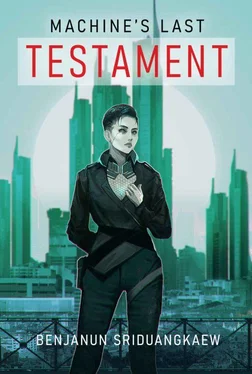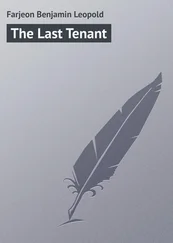The warden stares, unsure whether she has been insulted. Then she stiffens—another order from her puppeteer telling her to stay put either way.
Ovuha pushes on, partly to locate the limits, the slack this mysterious interlocutor means to grant. “I often think on the functions of how Samsara assigns its citizens to work. Suitable labor must be offered to suitable minds, and there’s much to be said for that which is regular and routine.” On purpose she puts on the most sculpted Putonghua accent, the register of class-prime citizens who attend exquisite weddings and wear clothes made by the Taheen Sahls of the world. “The process fascinates me. Everyone thinks they’re destined for something lofty. What if you’re disappointed?”
Hinata frowns at her before saying, “No one is disappointed, Ovuha.” Her smile is supercilious. “Citizens know where we belong, and every individual quality is accounted for, lesser or greater. Predilections. Personalities. We are put where we are meant to be. That is the joy and grace of Samsara, and if you become a citizen you will know it too.”
“I should hope so. Where are we heading, Warden?”
That pause, during which—she imagines—Hinata tries to argue with her handler. “Khrut. A splendid place.”
One of the coastal cities: she was right about the trajectory. Ovuha compares their proximate location to the map she’s memorized, the shuttle’s velocity, where they should be right now. It is not precise—human memory can only store and calculate so much—but she judges it sufficient. She moves quickly. Elbow into the jaw of the dozing warden, fist into his solar plexus, the edge of a palm to the softness of a throat. She delivers each strike with precision: in cramped quarters there’s not much momentum to gather and give out, but she makes do. Given tactical training he might have reacted faster; given better threat assessment he would have had Ovuha fettered. It is moot.
Hinata gasps, moves to draw her gun; she would already have sent out an alert, no stopping that. Ovuha slams her into the wall, knocking the breath out of her, and says, “In the place where all things begin, the sun sets in the east and the birds rise from the west, and so the sky is always the color of wings.” She holds Hinata’s gaze. “Captain Hinata, your lord has need of you.”
Hinata jolts. A switch inside her prefrontal cortex flips. Her face, pinched with pain, undergoes a peculiar transformation: as if the mind behind it has suddenly been replaced with another’s, a complete metamorphosis of thought, memory, personality. Even soul, if one believes in the existence of such. “My… lord?” she croaks. “You’re—you’re the Warlord of the Thorn.”
Ovuha switches to a code patois, based on Putonghua and a few other more obscure dialects. Nothing Samsara can’t penetrate, but it buys them time. “Yes. Send out an all-clear.” Though it would have been too late: Samsara received Hinata’s distress signal minutes ago. “How long until Interior Defense reaches us? And can you shut down your guidance, your feeds, anything?”
“Five minutes and thirty-six seconds, my lord. I’ve sent an all-clear, that it was a false alarm, but—” Hinata gestures at her colleague. The colleague in her false life. “I can’t shut down any of that, Samsara has its eyes on us at all times. The things I did to you…”
“Never mind that, we haven’t the time, consider yourself pardoned fully and thoroughly. Can you take control of the drones? I need to go somewhere, I’ll give you the coordinates.”
An unsteady nod. Hinata massages her side, taking quick sharp breaths. Even her gaze is different, clearer and more focused. Like all officers sent here by the previous Thorn, placed to facilitate Ovuha’s trajectory, she is faultlessly loyal and does not question: she was already informed, before her arrival here, that the Thorn who’d meet her would be the successor, a stranger to Hinata. Nevertheless.
Hinata unseals the pilot’s compartment. Within it, two drones. Each taller than an adult person, at full height. For the time being they are folded compact, joined to the car’s controls. One has the face of a marmoset, eyes nearly adjacent, miniature muzzle and miniature mouth. The other is more abstract, a slender chassis shaped like a bottle, headless. Many drones are, if not unique, distinct: a work of considered design. Anatta has resources to spare, entire labs of engineers and artists whose only task is to envision and enhance the next generation of automaton aesthetics.
“Direct me,” says Hinata. “I have access yet and I can make them shift course.”
Ovuha doesn’t waste time. Cerebral implants don’t require external power—the human body provides, it is its own furnace, burning without cease. She lacks the full suite; hiding even the handful of embeds in her cortex and spine was a campaign unto itself. Replacing every implant with nonstandard ones, ensuring that they are hardened against electromagnetic disruption and hidden from medical examination. They’ve all escaped Bureau detection, but what remains to her is a scant and skeletal thing.
Her datasphere activates. A flare of pain behind her eyes, pressure between her brows, the upheaval of nerves pulling taut, taut, the edge of snap: as if her entire limbic system is about to fail, as if every synapse has fired at once. Nausea tightens her throat and her vision wavers, white and black at the edges, starry. Warmth trickles down her nose. Nearly without visual interface, but there is enough. She gives Hinata the coordinate while she dabs at her nostrils, at the tarry blood. They are an hour from where she wants to be and will not be able to reach the exact spot—that region is not so much absent from maps as interdicted. Good enough. She goes through the downed warden’s equipment: sidearm, ammo, anti-riot grenades, first-aid supplies. No food or water. She liberates a belt and a holster, boots and gloves.
“Do you think,” she says, “you can return undercover?”
“With difficulty, my lord.” A pause. “You will not require my presence?”
“Where I’m going, it won’t be safe.” That stretches the truth. She feels a pang—for all that it is necessary, for all that the officers sent here volunteered as sacrifices, they each deserve better. “I’ll return for you. Until then—”
Hinata grimaces. “Interior Defense is nearly upon us, my lord. I can take you a little closer, but…”
“No matter. Open this vehicle.” She takes Hinata’s shoulders with both hands. By the time the captain signed up for this, Ovuha was still being trained, taught the secrets that would become her mantle as well as her burden. “It’s imperative to me that you survive and remain at liberty. Live. Your service isn’t yet at an end.”
“Not until you’ve done what you have come here to do.” The captain gives her an abbreviated salute. “In death or in life, my lord, I’ll pray for your victory.”
All this, for a warlord Hinata has seen for the first time. This absolute faith in the title. This total trust in what Ovuha’s predecessor orchestrated, and that Ovuha—carrying it out—would triumph.
The hatches click as they unlock. She opens the nearest. The wind buffets her, razor currents, harsh and relentless. Her window of time narrows. In the distance, the gleam of an Interior Defense patrol closes in: a large drone and a car that carries human officers. Hinata guides the craft to a lower altitude but she is losing control. The drones have stirred, optics flaring, weapons extending. In a few minutes they will no longer obey Hinata at all. It is not an ideal circumstance, but from the start it was impossible to arrange the ideal groundwork, the ideal arrival—there were too many variables, and successfully placing anyone on Anatta at all was itself a miracle.
Читать дальше












